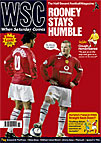 With talk of the club being up for sale, the heady days of Jack Walker's reign at Blackburn Rovers seem so long ago, Bruce Wilkinson writes
With talk of the club being up for sale, the heady days of Jack Walker's reign at Blackburn Rovers seem so long ago, Bruce Wilkinson writes
Reports in the Daily Mirror that the owners of Blackburn Rovers could be willing to listen to offers for the club have come as a shock to the team’s supporters, under the impression that the Jack Walker Trust, set up on his deathbed, would run the club in perpetuity.
Although chief executive John Williams tried to play down the reports, he told the Lancashire Evening Telegraph that if a bidder was to come forward, the trust would be willing to listen to offers: it appears that Blackburn Rovers are not for sale in the same way that Damien Duff wasn’t for sale to Chelsea.
One of the main benefits of Jack Walker taking over at Ewood Park, besides the obvious financial ones, was the stability it offered. The club were being run in their own best interests by one of their biggest fans, rather than someone looking to make a quick buck by selling the ground for redevelopment. In addition to winning the Premiership, Walker’s money rebuilt crumbling Ewood Park and set up a multimilllion-pound training facility containing a youth academy. Now the whole period feels like a dream that Rovers fans are starting to awake from.
When Walker died in August 2000, supporters were promised that a trust had been set up containing the companies that he owned and run, the profits from which were to be pumped into Blackburn Rovers. As long as the team retained something like their former position in the top division and the money kept coming, in supporters were prepared to ignore the fact that no one seemed to know who exactly controlled the purse strings.
At first, this new arrangement seemed to be working. The trust kept the youth academy running, developing stars such as David Dunn and Duff, and continued to help buy top players such as Andy Cole. Promotion back to the Premiership, winning the League Cup and two years in Europe seemed to indicate that all was well.
But even at the point that Walker took over and pumped in the millions he made from the steel industry, he was warning that at some point in the near future the club would have to be self-financing: gate receipts and TV money were meant to more than match the annual input from the trust, believed to be up to £3 million a season. Now it seems that the cost of keeping a team in the top division is beginning to stretch Rovers’ resources to the limit.
There has been a steady decline in attendance figures and season-ticket sales over the past couple of seasons – a little strange given that sixth place in 2002-03 was the best finish since the championship of 1995. This drop has continued in the new season in spite of attempts by the club to attract new supporters and maintain the existing following through imaginative marketing and ticketing schemes.
Statements from the club over the past two or three years warned that if attendances didn’t regularly reach somewhere near the 30,000 mark, eventually cuts would be made. If anything, the figures are edging downwards, nearer to 20,000.
Graeme Souness began to complain a couple of years ago that he would need more money to buy players to keep the club in the top division, but the funds didn’t seem to be available. Instead, Rovers began to make less high-profile signings for lower amounts and on smaller wages.
At the time this seemed not much more than sensible housekeeping. In retrospect, it could be seen to be more of a signal of a change of direction within the club, as does the fact that the club shop has now become a general sports retailer, with little space for Blackburn Rovers souvenirs, which seems odd for a team with between 20,000 and 30,000 supporters.
Some fans also now wonder whether Souness’s move to Newcastle in September was as much due to knowledge of the team’s financial plight as it was the draw of a bigger club. Despite the high profile appointment of Mark Hughes and his subsequent signing of Youri Djorkaeff, it seems that a new financial reality is taking shape. Doubtless to sniggering from other football fans around the country, Blackburn look to be drifting back to their pre-Walker era position.
Come back Howard Gayle, all is forgiven.
From WSC 213 November 2004. What was happening this month